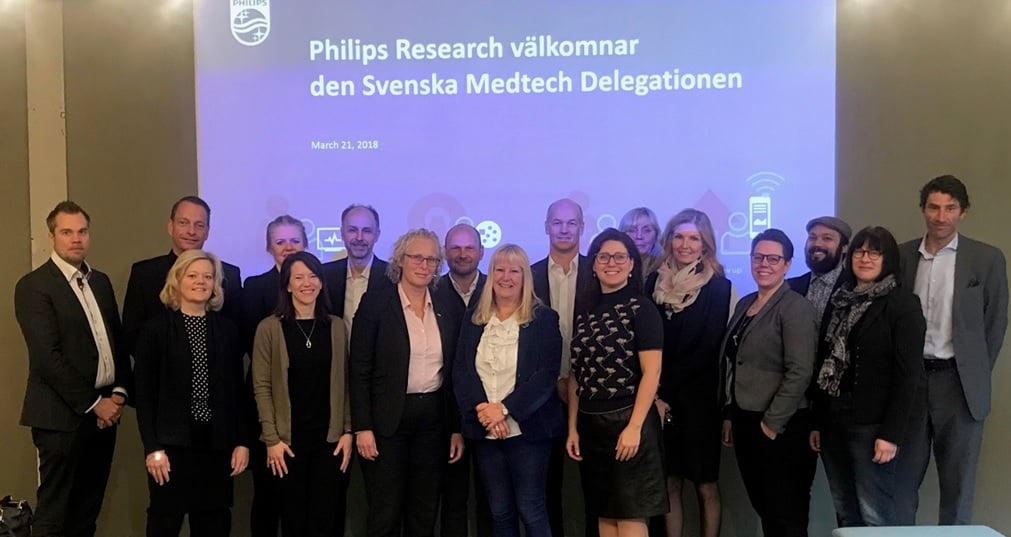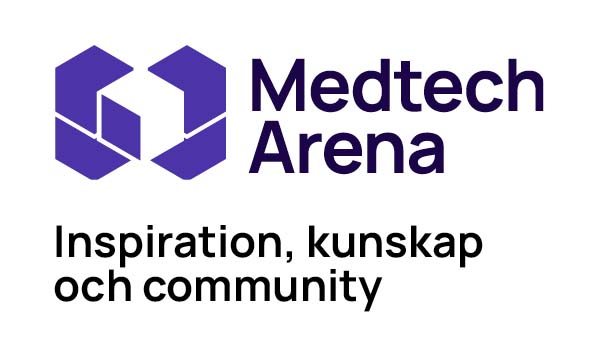
Phillips group photo
Innovation for future healthcare: Netherlands study trip
Travel report from a study trip to the Netherlands 19-21 March, 2018. Subject: Innovation for future healthcare, in particular cancer care
Swedish Medtech, Swecare and Medtech4Health organised a study visit to the Netherlands to show how Dutch healthcare works to create high quality leading-edge care. The visit focused on how the Netherlands initiates, implements and values research and innovative co-operation between universities, healthcare and companies. The examples highlight primarily the latest insights in advanced cancer care.
Health care in the Netherlands often ranks high internationally and has long been considered both advanced and innovative. Several global medical technology companies have chosen to place large research investments in the Netherlands. The major research collaboration between companies, universities and healthcare in the field of cancer care was highlighted during the visit. Participants were given the opportunity to learn more and gain a deeper understanding of the basis for successful collaboration.
Netherlands Cancer Institute, NKI, and Antoni van Leeuwenhoek Hospital, AVL, Amsterdam
NKI/AVL is both a hospital and a research center. It is also the only specialized cancer hospital in the Netherlands, thus having national and international roles as a research specialist hospital in its area.
As a research center, NKI has 201 PhD employees. Among active researchers, 22% have been recruited from other countries. Eleven projects are funded by the European Research Council (ERC) and during 2017, 101 clinical trials were started.
Antoni van Leeuwenhoek Hospital, AVL, has 180 beds for inpatients and 50 beds for day care patients. The hospital grows by about 5% annually and receives about 10,000 new patients each year. Of patients, 23% are included in clinical trials.
In its research, NKI / AVL is focused on five areas: fundamental research on the biology of cancer; immunotherapy to understand how the body’s immune system affects cancer treatment; image processing where imaging guides radiation therapy; and personalised medicine – tailored treatment based on the patient’s genome and survivorship, focusing on the quality of life before, during and after cancer.
During our visit we met, among others, Prof. E. Voest, Board member, Dr. K. Verhoef, TTO Manager, Prof. G. Meijer, Head of the Department of Pathology, Prof. R. Beets-Tan, Head of the Department of Radiology, Dr. E. Damen, medical physicist in radiation oncology and Prof. U.A. Van der Heide, Group Leader and medical physicist in radiation oncology.
University Medical Center Utrecht, UMC
UMC Utrecht is a leading university hospital in the Netherlands with the goal of having a leading position in research and innovation in a number of areas, including oncology. During the visit we received a review of the development of radiation therapy and future opportunities.
The vision for the work is that the dose in treatment be controlled by cell density and type of tumor, avoiding damage to healthy tissue and improving local cancer therapy, and that the treatment be non-invasive, i.e. surgery without a knife.
During the visit to UMC, we met, among others, Prof. Jan Lagendijk, Head of Radiation Oncology, Radiology and Nuclear Medicine Physics of the Imaging Division of the UMC Utrecht and Frank Miedema, Dean and Vice-President of the Executive Board.
During the visits to NKI/AVL and UMC Utrecht, we discussed industrial co-operation, international research projects, data processing, research infrastructures, and challenges such as the lack of staff, mainly nurses. We also discussed what the Dutch Government’s research and innovation efforts mean for the start-up and implementation of R&D co-operation with companies and how this differs between large and small companies.
Innovation as a goal
Both hospitals highlighted the importance of innovation as a goal. They said that by communicating this clearly in the organisation, leadership is directed toward development. In this work they stated that co-operation with companies is crucial and that the goal is for ideas that lead to innovations that are really implemented. At the same time there are obstacles to this. Some of the success factors raised were incentive structures for clinical research aimed at achieving benefits, and that are not solely rewarded for reaching publication. Mobility between companies and hospitals was also a factor that facilitated co-operation by enabling different partners to better understand the conditions one another operate under.
During both visits, the group gained an insight into where the research front in the area of cancer care lies in terms of both diagnosis and treatment. How to spread results was a topic that was discussed. At NKI, it has been estimated that it takes 4 years before 75% of patients have access to a new treatment.
REshape Innovation Center at Radboud UMC, Nijmegen
The visit to the REshape Innovation Center had a little different focus from the earlier visits. During this visit, we received an inspiring and thoughtful presentation from Lucien Engelen, Director of REshape. In the subsequent discussion, challenges facing the healthcare sector were raised. How to face the increased demand for care, reduced budgets and lack of trained staff were some of the challenges discussed. Changes in the patient’s role were also discussed, how patients and relatives demand to be more involved in treatment.
New technology means new opportunities. REshape Innovation Center is part of the Radboud UMC University Hospital. Radboud is a hospital with approximately 10,000 employees and 3,500 students. REshape focuses on how the hospital is going to handle and meet changes such as healthcare meetings. They conduct meetings and conferences to exchange thoughts on this. They also research how these processes of change act in order to push forward progress.
More specific topics raised during our visit include the future healthcare market globally, digital health, health data, advanced home technology, patient-centered care, cultural change, leadership and much more. To read more about the ReShape Innovation Center, see their website www.radboudreshapecenter.com
High Tech Campus, HTC, Eindhoven
Philips started 125 years ago in the Netherlands with the incandescent lamp as its first product. Development over the years has led to the company’s focus being today mainly in the field of healthcare. The company has 74,000 employees in more than 100 countries. The company invests approximately 10% of its sales revenue on research and development annually. Philips has changed its way of working from the previous closed doors approach, where the company’s own employees developed new technology, into extensive collaborations with universities, research institutes and healthcare. They argue that the best way forward involves open innovation and a broader road to innovation in ecosystems with many stakeholders including the company’s customers.
Among future areas, the company considers Artificial Intelligence and Health Data to be key elements for developing future areas such as precision medicine and personal treatment, value-based care, data-driven solutions, patient involvement and care via portals and apps.
During the visit, we met regional partners like the University of Eindhoven (https://www.tue.nl/), the Maxima Medical Center, the Catharina Hospital (https://www.catharinaziekenhuis.nl/) and the Kempenhaeghes Hospital (https://www.kempenhaeghe.nl/).
Factors affecting success
Factors that affect the success of co-operation are:
- high quality work,
- a language that makes it easy to understand one other (proximity),
- shared services,
- equal relations between partners,
- that areas of co-operation are within the main areas of interest of the organisations,
- attitude and the goal to achieve results that lead to practical use and not just publication
- and, not least, to be able to reach each other by bike.
During the visit to HTC we met, among others, Hans Hofstraat Vice President, Innovation Program Manager, Philips Research, Carmen van Vilsteren, Director Strategic Area Health TU Eindhoven, Lukas Dekker, Cardiologist Catharina Hospital, Sebastiaan Overeem, Somnologist Kempenhaeghe Hospital and Kurt Ward, Senior Design Director, Philips Design.
Summary
In summation we can say that the visit’s intensive days gave us many examples of close co-operation between healthcare, companies and universities focusing on the research, development and implementation of, among other things, the radiation therapy of the future. Because just radiation therapy is a highly complex and technologically advanced technique, the importance of these partnerships is based on long-term thinking and therefore continues for many years. The importance of government initiatives for R&D co-operation, and the way that different stakeholders meeting in a creative work environment can contribute to many new innovations were further lessons from the trip.
List of participants
Johan Folkunger, Styrelseledamot Swedish Medtech och vd Philips
Margareta Fransson, Regionråd Region Östergötland
Reidar Gårdebäck, Programdirektör, Medtech4Health
Cecilia Halle, Ämnesråd, Socialdepartementet
Maria Helling, vd Swecare
Nima Jokilaakso, Projektledare, Swecare
Anna Lefevre Skjöldebrand, vd Swedish Medtech
Magnus Lindholm, Ordförande Swedish Medtech och vd Baxter
Lena Lundgren, Hälso- och sjukvårdsdirektör, Region Östergötland
Vivianne Macdisi, Ordförande Swecare och Regionråd, Region Uppsala
Sofia Medin, Chefsstrateg, Swedish Medtech
Marie Morell, Regionråd, Region Östergötland
Jenni Nordborg, Direktör och avdelningschef Hälsa, Vinnova och samordnare för regeringens samordningsfunktion för Life Science
Lotta Saleteg Falk, E-hälsostrateg, Region Östergötland
Nicklas Sandström, Landstingsråd Västerbottens läns landsting
Andreas Scheutz, forsknings- och innovationsdirektör, Region Uppsala
Bengt Eric Rösth, Business Manager Oncology, Elekta
Robert Winroth Innovationslandstingsråd, Västerbottensläns landsting
AKTUELLT
Glad sommar önskar vi från Medtech4Health
Efter en intensiv vår är det snart dags för en välbehövlig sommarpaus. Men först ser vi fram emot att ses i Almedalen där vi är en del av mötesplatsen Tillsammans.
SO Västra stärker innovationskraften genom samverkan och erfarenhetsutbyte
Medtech4Healths nod SO Västra har gjort programmet till en naturlig del av innovationsarbetet i Västra Götaland. Här finns en stark samverkan där metoder och erfarenheter delas framgångsrikt.
Nytt verktyg ska bana vägen för smidigare breddinförande av medicinteknik
Först ut från Medtech4Healths strategiska projekt MedImpact är ett instrument för enklare breddinförande av teknik för egenmonitorering. Med instrumentets frågebatteri blir det möjligt att undvika fallgroparna vid ett breddinförande. Instrumentet finns på Medtech Arena.
Nya satsningar ska göra det lättare för små innovativa medicintekniska företag
Regeringen har gett flera nya uppdrag till myndigheter som arbetar med medicinteknik. Målet är att stärka sjukvården och förbättra Sveriges beredskap vid kriser.
NYHETSBREV
Följ nyheter och utlysningar från Medtech4Health - prenumera på vårt nyhetsbrev.



